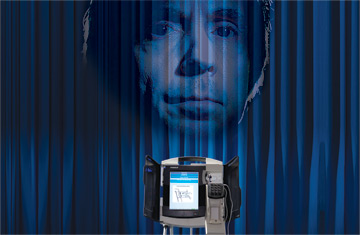
Despite a spotty past, Internet activist Brett Kimberlin has played a central role in the debate over electronic voting.
(2 of 4)
In Kimberlin's mind, his successes are the product of special powers obtained through meditation. "I have evolved to where I can dip into the place of universal consciousness and tap into its very powerful forces to effect change in a positive way," he wrote in an e-mail to me late in my reporting for this story. In reality, he's just one moving part in a large, complex dynamic. But Kimberlin's grandiosity is as representative of certain parts of the blogosphere as his lack of credibility, all of which makes him a good case study of how the wilder parts of the Web are affecting the most basic functions of our democracy.
THE 1978 BOMBINGS FOR WHICH KIMBERLIN was convicted--the motives are unknown-- maimed one man and terrified the town of Speedway, Ind. Kimberlin still professes his innocence, although when he was arrested, authorities found timers in his possession matching the ones used in the bombs. After his release from prison in 1993, Kimberlin pursued a musical career and an import-export business, eventually landing in his mother's basement in suburban Washington with a wife and two children. It is a constrained existence. The one-room apartment, with its low, dropped ceiling and stuccoed walls, has room for a double bed, a few stuffed chairs and a TV. After the contested 2000 election, he converted a hallway leading to the bathroom into a workplace, with a computer and modem. From that cramped space, he tapped into the expanding universe of online political activism.
The turning point for Kimberlin came with an idea to attract attention. Before the 2004 presidential election, he contacted the wealthy head of a foundation in Ohio who practiced transcendental meditation with Kimberlin's sister. After the vote, with a pledge from the benefactor, Kimberlin posted on justicethroughmusic.org a $100,000 reward for any evidence that the election had been stolen. And things took off. First, the reward attracted blogger Brad Friedman, who then co-founded the netroots voting-reform website VelvetRevolution.us with Kimberlin and serves as his face man. The reward attracted other donors (including a politically active relative of mine who last year introduced me to Kimberlin). And it produced several people who claimed to have information on problems with electronic voting. They were prominently displayed on Friedman's site, BradBlog.com Leveraging his website's popularity, Kimberlin made contact with congressional staff members and other activists, launching coordinated netroots campaigns for the cause.
In e-mails to me, Kimberlin claims his whistle-blowers "exposed Republican efforts to steal votes" and that a divestiture campaign targeting the nine e-voting-machine makers "helped to drive Diebold stock down by more than 30%" and "caused numerous investigations of Diebold and other companies." In fact, no one has been charged as a result of Kimberlin's hell-raising. Yvonne Varano, who analyzes Diebold for investment firm Jefferies & Co. Inc., says the blogosphere's war on the company "has had a minimal effect" on its stock price. Diebold is under formal investigation by the SEC, whose spokesman declined to comment, but Varano said the inquiry is focused on accounting practices. Notably, no one has yet successfully claimed Kimberlin's reward, which has now grown to $500,000.
